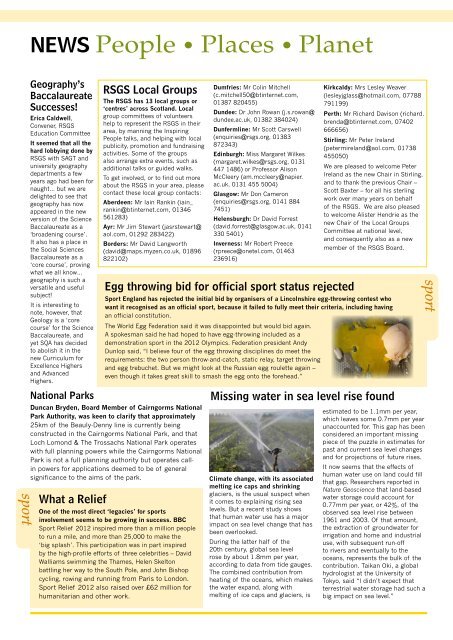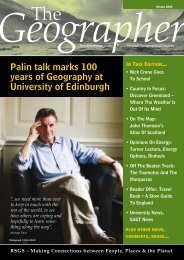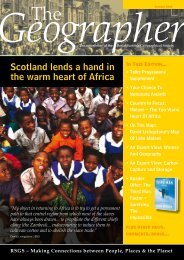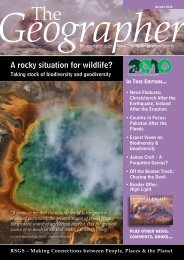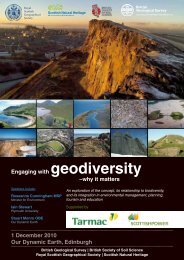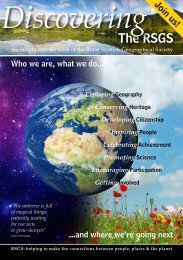Summer - Royal Scottish Geographical Society
Summer - Royal Scottish Geographical Society
Summer - Royal Scottish Geographical Society
You also want an ePaper? Increase the reach of your titles
YUMPU automatically turns print PDFs into web optimized ePapers that Google loves.
NEWS People • Places • Planet<br />
Geography’s<br />
Baccalaureate<br />
Successes!<br />
Erica Caldwell,<br />
Convener, RSGS<br />
Education Committee<br />
It seemed that all the<br />
hard lobbying done by<br />
RSGS with SAGT and<br />
university geography<br />
departments a few<br />
years ago had been for<br />
naught… but we are<br />
delighted to see that<br />
geography has now<br />
appeared in the new<br />
version of the Science<br />
Baccalaureate as a<br />
‘broadening course’.<br />
It also has a place in<br />
the Social Sciences<br />
Baccalaureate as a<br />
‘core course’, proving<br />
what we all know…<br />
geography is such a<br />
versatile and useful<br />
subject!<br />
It is interesting to<br />
note, however, that<br />
Geology is a ‘core<br />
course’ for the Science<br />
Baccalaureate, and<br />
yet SQA has decided<br />
to abolish it in the<br />
new Curriculum for<br />
Excellence Highers<br />
and Advanced<br />
Highers.<br />
sport<br />
National Parks<br />
What a Relief<br />
RSGS Local Groups<br />
The RSGS has 13 local groups or<br />
‘centres’ across Scotland. Local<br />
group committees of volunteers<br />
help to represent the RSGS in their<br />
area, by manning the Inspiring<br />
People talks, and helping with local<br />
publicity, promotion and fundraising<br />
activities. Some of the groups<br />
also arrange extra events, such as<br />
additional talks or guided walks.<br />
To get involved, or to find out more<br />
about the RSGS in your area, please<br />
contact these local group contacts:<br />
Aberdeen: Mr Iain Rankin (iain_<br />
rankin@btinternet.com, 01346<br />
561283)<br />
Ayr: Mr Jim Stewart (jasrstewart@<br />
aol.com, 01292 283422)<br />
Borders: Mr David Langworth<br />
(david@maps.myzen.co.uk, 01896<br />
822102)<br />
Dumfries: Mr Colin Mitchell<br />
(c.mitchell50@btinternet.com,<br />
01387 820455)<br />
Dundee: Dr John Rowan (j.s.rowan@<br />
dundee.ac.uk, 01382 384024)<br />
Dunfermline: Mr Scott Carswell<br />
(enquiries@rsgs.org, 01383<br />
872343)<br />
Edinburgh: Miss Margaret Wilkes<br />
(margaret.wilkes@rsgs.org, 0131<br />
447 1486) or Professor Alison<br />
McCleery (am.mccleery@napier.<br />
ac.uk, 0131 455 5004)<br />
Glasgow: Mr Don Cameron<br />
(enquiries@rsgs.org, 0141 884<br />
7451)<br />
Helensburgh: Dr David Forrest<br />
(david.forrest@glasgow.ac.uk, 0141<br />
330 5401)<br />
Inverness: Mr Robert Preece<br />
(rpreece@onetel.com, 01463<br />
236916)<br />
Egg throwing bid for official sport status rejected<br />
Kirkcaldy: Mrs Lesley Weaver<br />
(lesleyjglass@hotmail.com, 07788<br />
791199)<br />
Perth: Mr Richard Davison (richard.<br />
brenda@btinternet.com, 07402<br />
666656)<br />
Stirling: Mr Peter Ireland<br />
(petermireland@aol.com, 01738<br />
455050)<br />
We are pleased to welcome Peter<br />
Ireland as the new Chair in Stirling,<br />
and to thank the previous Chair –<br />
Scott Baxter – for all his sterling<br />
work over many years on behalf<br />
of the RSGS. We are also pleased<br />
to welcome Alister Hendrie as the<br />
new Chair of the Local Groups<br />
Committee at national level,<br />
and consequently also as a new<br />
member of the RSGS Board.<br />
Sport England has rejected the initial bid by organisers of a Lincolnshire egg-throwing contest who<br />
want it recognised as an official sport, because it failed to fully meet their criteria, including having<br />
an official constitution.<br />
The World Egg Federation said it was disappointed but would bid again.<br />
A spokesman said he had hoped to have egg-throwing included as a<br />
demonstration sport in the 2012 Olympics. Federation president Andy<br />
Dunlop said, “I believe four of the egg throwing disciplines do meet the<br />
requirements: the two person throw-and-catch, static relay, target throwing<br />
and egg trebuchet. But we might look at the Russian egg roulette again –<br />
even though it takes great skill to smash the egg onto the forehead.”<br />
Duncan Bryden, Board Member of Cairngorms National<br />
Park Authority, was keen to clarify that approximately<br />
25km of the Beauly-Denny line is currently being<br />
constructed in the Cairngorms National Park, and that<br />
Loch Lomond & The Trossachs National Park operates<br />
with full planning powers while the Cairngorms National<br />
Park is not a full planning authority but operates callin<br />
powers for applications deemed to be of general<br />
significance to the aims of the park.<br />
One of the most direct ‘legacies’ for sports<br />
involvement seems to be growing in success. BBC<br />
Sport Relief 2012 inspired more than a million people<br />
to run a mile, and more than 25,000 to make the<br />
‘big splash’. This participation was in part inspired<br />
by the high-profile efforts of three celebrities – David<br />
Walliams swimming the Thames, Helen Skelton<br />
battling her way to the South Pole, and John Bishop<br />
cycling, rowing and running from Paris to London.<br />
Sport Relief 2012 also raised over £62 million for<br />
humanitarian and other work.<br />
Missing water in sea level rise found<br />
Climate change, with its associated<br />
melting ice caps and shrinking<br />
glaciers, is the usual suspect when<br />
it comes to explaining rising sea<br />
levels. But a recent study shows<br />
that human water use has a major<br />
impact on sea level change that has<br />
been overlooked.<br />
During the latter half of the<br />
20th century, global sea level<br />
rose by about 1.8mm per year,<br />
according to data from tide gauges.<br />
The combined contribution from<br />
heating of the oceans, which makes<br />
the water expand, along with<br />
melting of ice caps and glaciers, is<br />
estimated to be 1.1mm per year,<br />
which leaves some 0.7mm per year<br />
unaccounted for. This gap has been<br />
considered an important missing<br />
piece of the puzzle in estimates for<br />
past and current sea level changes<br />
and for projections of future rises.<br />
It now seems that the effects of<br />
human water use on land could fill<br />
that gap. Researchers reported in<br />
Nature Geoscience that land-based<br />
water storage could account for<br />
0.77mm per year, or 42%, of the<br />
observed sea level rise between<br />
1961 and 2003. Of that amount,<br />
the extraction of groundwater for<br />
irrigation and home and industrial<br />
use, with subsequent run-off<br />
to rivers and eventually to the<br />
oceans, represents the bulk of the<br />
contribution. Taikan Oki, a global<br />
hydrologist at the University of<br />
Tokyo, said “I didn’t expect that<br />
terrestrial water storage had such a<br />
big impact on sea level.”<br />
sport


